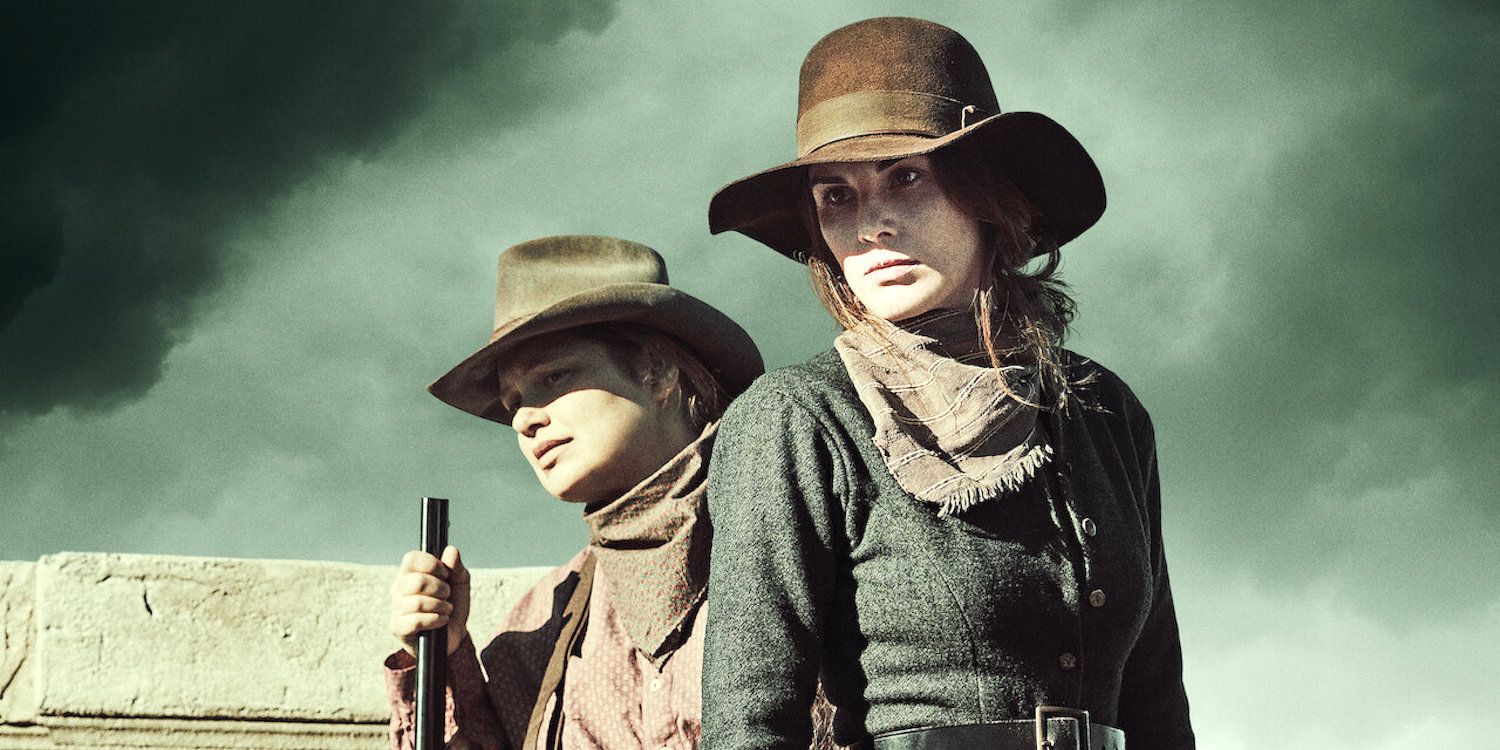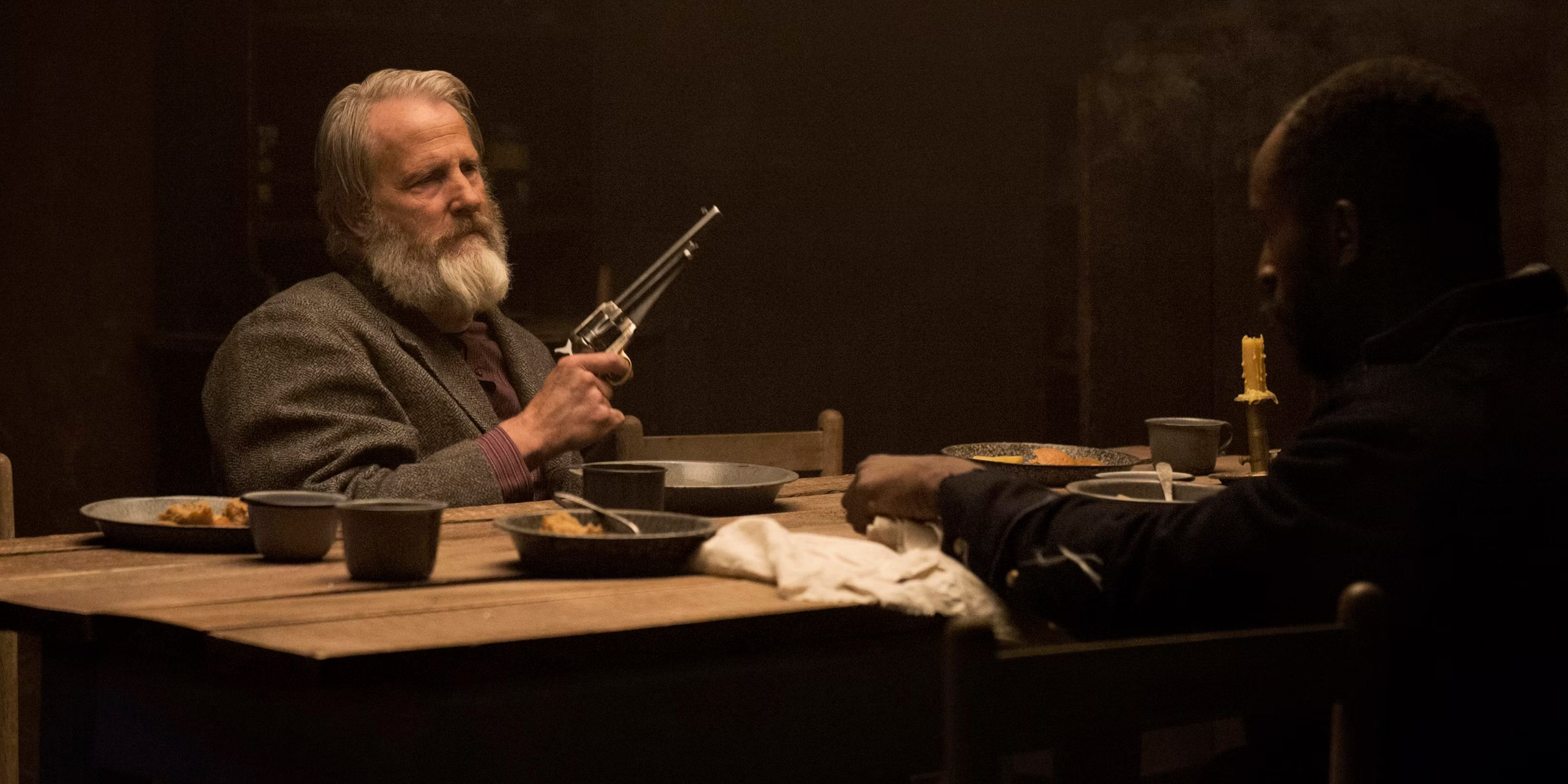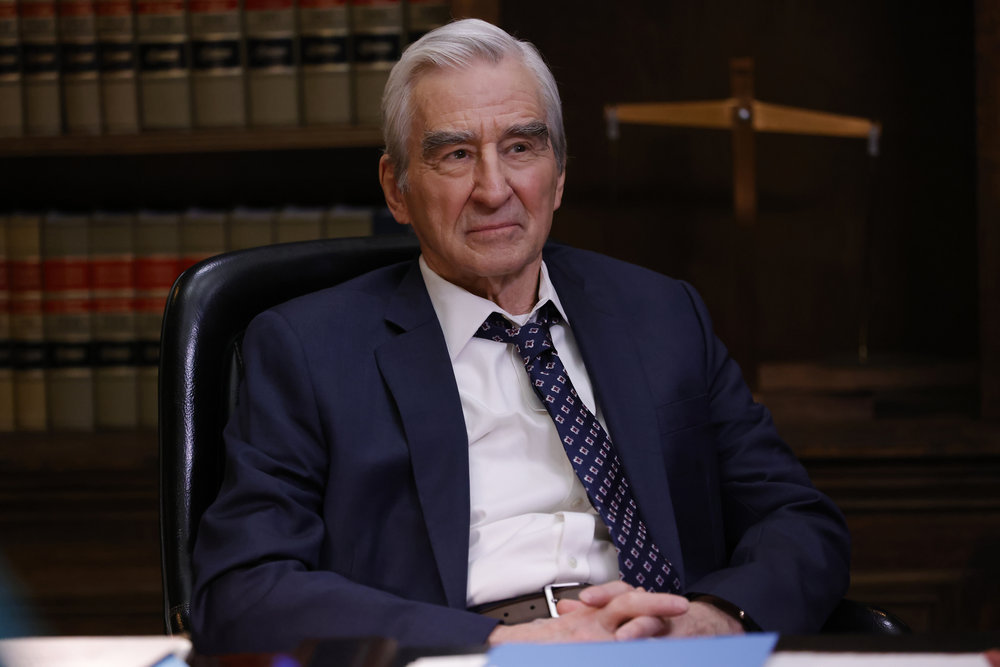The Big Picture
- Godless diverts the attention of Western lovers from films to television, breathing new life into the genre.
- The score of Godless is remarkable, expertly embodying the emotional journey of the characters.
- The women of La Belle take center stage in Godless, bringing a modern sensibility to the classic tropes of the Western genre.
Like sifting for gold from a creek, each generation of filmmakers either preserves or discards the tropes of a genre to create works that can keep the past alive, while giving life to new forms of storytelling. The Western is perhaps the most stringent and lasting genre of American film, and each iteration has almost always ridden closely alongside its predecessors — often entertaining but seldom innovating. That is until Godless came along. Written and directed by Scott Frank, Godless has somehow managed to divert the gaze of Western lovers from the genre’s immense catalog of films to an unexpected place: television.
A member of an increasingly refined species of TV, the limited series, Godless premiered on Netflix in November 2017 to wide praise from critics and audiences alike. Set in and around the small mining town of La Belle, the show follows infamous outlaw Frank Griffin (Jeff Daniels) and his men as they wreak havoc upon New Mexico in the late 1800s. Bent on revenge, Griffin scours the land for his former pseudo-son Roy Goode (Jack O’Connell), who’s abandoned his gang of bandits and taken refuge at a remote ranch outside of La Belle. After suffering heavy losses in a sudden mining accident, La Belle is now populated almost entirely by women, save for a sheriff with waning confidence (Scoot McNairy), a doe-eyed deputy (Thomas Brodie-Sangster), and a few meandering elders. While Roy Goode inches toward redemption at the guidance of Alice Fletcher (Michelle Dockery), his trail draws the terror of Frank Griffin ever closer, promising further death and destruction to an already devastated La Belle.
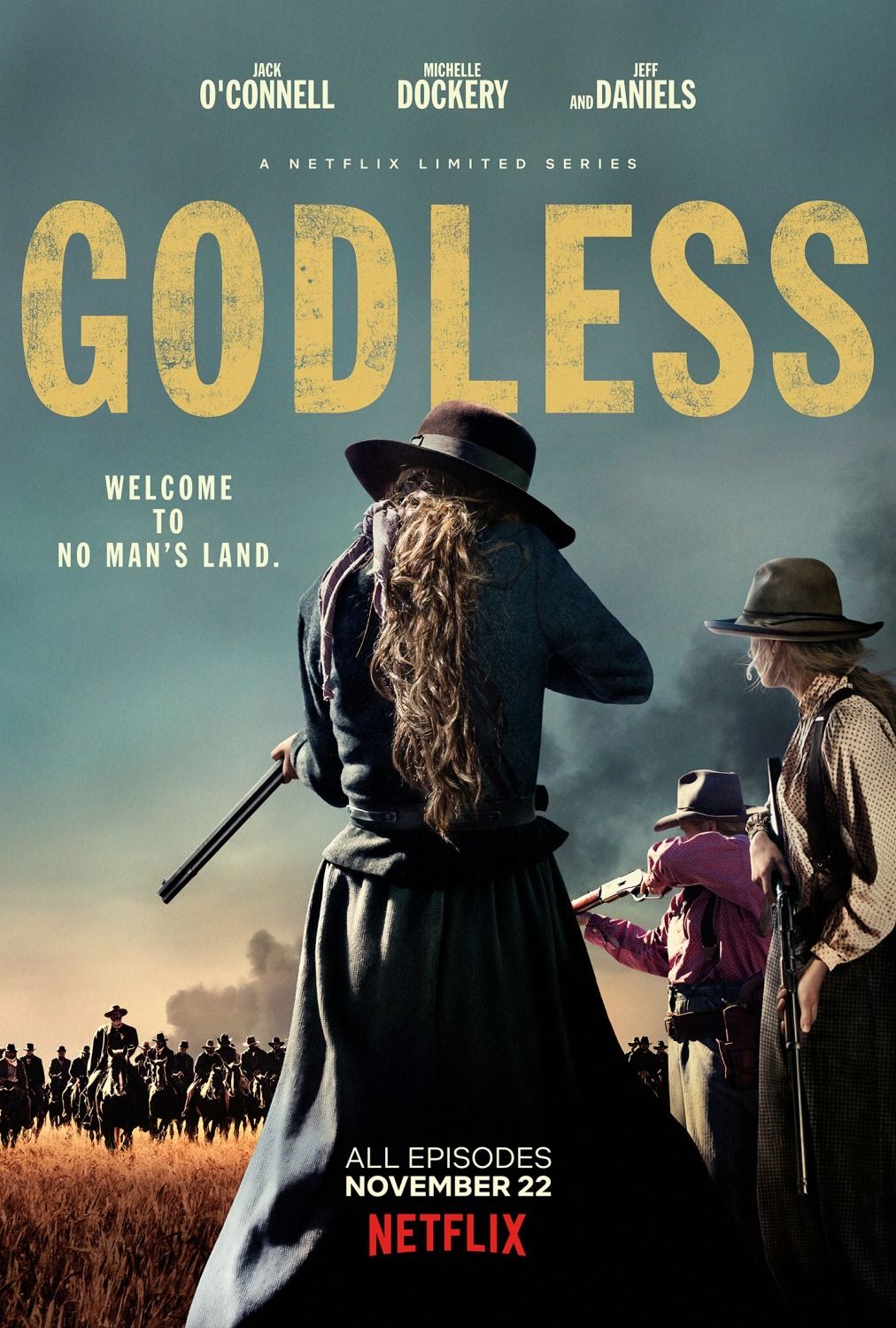
Godless
In the 1880s American West, murderous outlaw gang leader Frank Griffin hunts for ex-protege Roy Goode. Frank’s chase leads him to La Belle, New Mexico–a town inhabited, after a mining disaster, almost entirely by women.
- Release Date
- November 22, 2017
- Seasons
- 1
The Score in ‘Godless’ Is as Rich as the Story
Before we get to anything further, we have to talk about the score. Any Western worth its weight has a golden score helping to guide the story along. With only one major credit prior (2014’s A Walk Among the Tombstones), Carlos Rafael Rivera has already inserted himself into the upper echelon of composers with his work on Godless. From the first occurrence of the title sequence (which garnered a well-deserved Emmy Award for Main Title Design) the “Main Theme” strikes a chord deep in the viewer’s chest, conjuring the show’s feelings of lone defiance and imminent tribulation, with a simultaneous longing for love in a seemingly hopeless, barren landscape. How the central musical theme recurs throughout the series, changing in intensity and instrumentation as each scene sees fit, expertly embodies the emotional journey of the characters whenever words alone won’t suffice.
Jeff Daniels and Sam Waterston Are Instant Western Icons
Every Western needs its no-good outlaw. Much like Henry Fonda, who strayed from his typically sympathetic roles when playing Once Upon a Time in the West‘s villain, Jeff Daniels stepped out of his roots to take on one of the most menacing, spine-chilling antagonists in recent years. Armed with some of the most fear-inducing monologues to ever be uttered, Daniels fills Godless with a presence so commanding that it’s felt even when he’s not on-screen.
Tracking down Griffin and his mob of miscreants, Marshal John Cook has made it his mission to end Griffin’s reign of terror. As he has across his wide-spread career, Sam Waterston plays Marshal Cook with a genuine devotion to his character’s nature and truly embodies the charm of a classic American movie star. There’s something so endearing about a protagonist that seems to be full to the brim with pure virtue — a trope of Westerns that deserves to live on.
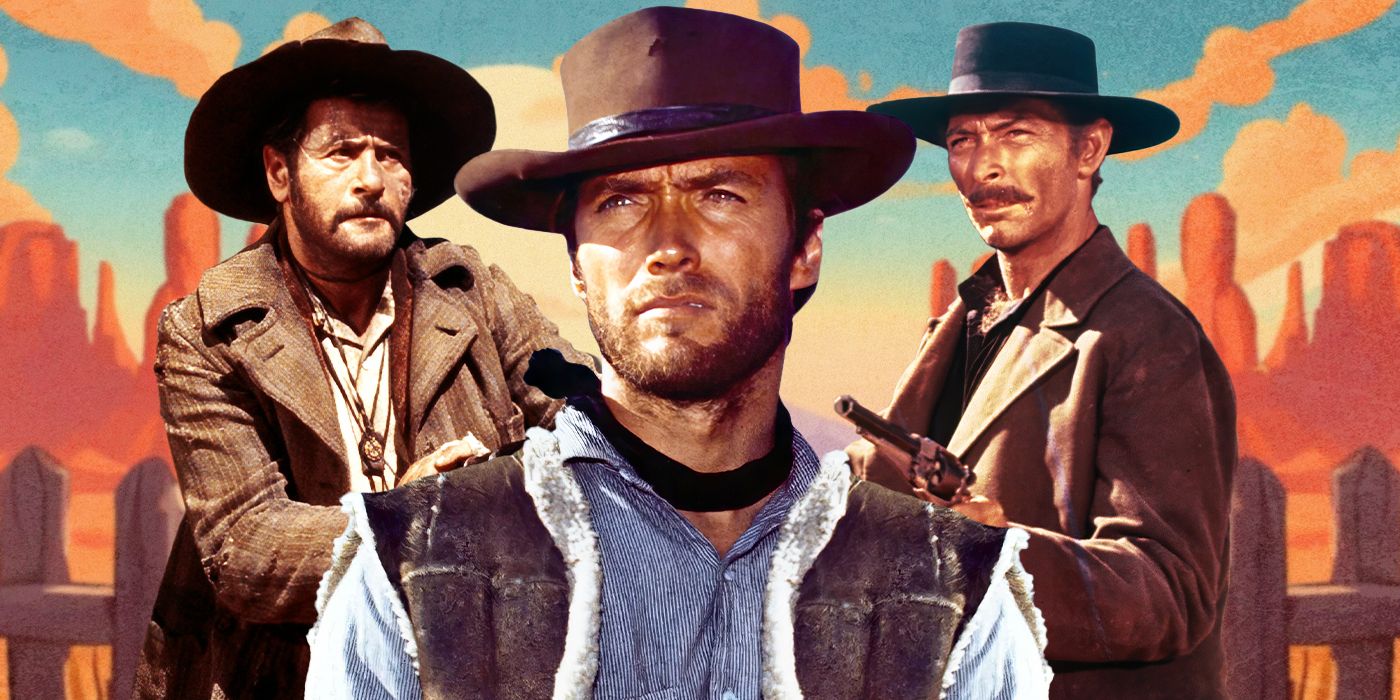
The Black-Hat Western Star Who Stole Scenes From Clint Eastwood
An underappreciated star stole scenes from the Western legend.
The Women of La Belle Are Second to None
There’s no question; Godless is at its best when the women are at the forefront. Led by Michelle Dockery as Alice Fletcher, a twice-widowed rancher living on the outskirts of La Belle with her son Truckee (Samuel Marty) and Iyovi (Tantoo Cardinal), the mother of her late husband. Initially viewed by the women of La Belle as an outsider, doomed to her own isolation, Alice has recused herself from companionship after an undeniably traumatic history. Dockery plays her with a delicate strength to great success. Speaking to Collider about taking on the role, Dockery expressed there was “absolutely no question that I wanted to be a part of it.” Godless is all the better with Dockery at its emotional center.
At no point does her journey toward new love or her utter devotion to the duty of motherhood come at the expense of her position as one of the genre’s greatest formidable protagonists (something generally reserved for the men of a Western). The arc from hardened caretaker to a loving and essential ally makes for one of the most layered and believable heroines to grace the screen, realized by both Scott Frank’s writing and Dockery’s faithful, skilled portrayal. “The script was absolutely amazing! It took my breath away, reading it. It’s something that Scott Frank has been working on for many years.”
Second to none, Merritt Wever shines as Mary Agnes McNue, sister of La Belle’s ailing sheriff Bill McNue. After the town’s widow-making tragedy, Mary Agnes (who was among those to lose their husband) has retaken her maiden surname and stepped into the role of La Belle’s unofficial leader. The epitome of a supporting cast masterclass (best known for her Emmy-winning turn in Nurse Jackie), Wever brought her masterful comedic background and wove it into the dour drama of Godless like a fine thread of steel. Torn between her vital stewardship over La Belle and the neglected exploration of her sexuality, Mary Agnes carries a new breed of warm, lovable strength into the Western genre.
All of Godless‘ women breathe new life into the world of the Western, both as individual characters and as a collective whole. The peril of an outlaw-surrounded town made almost solely of women is not just the central catalyst of conflict; it’s how this show forges all the classic tropes of an American Western with a modern sensibility to make a wholly unique, truly captivating experience. “It’s godless country,” Frank Griffin proclaims in one of his many baleful diatribes, “and the sooner you accept your inevitable demise, the longer you’re all gonna live.” As if professing directly to the genre itself, these words encapsulate the inevitable evolution of the Western, elevating Godless as the greatest of the 21st century.
Godless is currently streaming on Netflix in the U.S.























































![Social Media Spring Cleaning [Infographic] Social Media Spring Cleaning [Infographic]](https://imgproxy.divecdn.com/9e7sW3TubFHM00yvXe5zvvbhAVriJiGqS8xmVFLPC6s/g:ce/rs:fit:770:435/Z3M6Ly9kaXZlc2l0ZS1zdG9yYWdlL2RpdmVpbWFnZS9zb2NpYWxfc3ByaW5nX2NsZWFuaW5nMi5wbmc=.webp)
![5 Ways to Improve Your LinkedIn Marketing Efforts in 2025 [Infographic] 5 Ways to Improve Your LinkedIn Marketing Efforts in 2025 [Infographic]](https://imgproxy.divecdn.com/Hv-m77iIkXSAtB3IEwA3XAuouMwkZApIeDGDnLy5Yhs/g:ce/rs:fit:770:435/Z3M6Ly9kaXZlc2l0ZS1zdG9yYWdlL2RpdmVpbWFnZS9saW5rZWRpbl9zdHJhdGVneV9pbmZvMi5wbmc=.webp)




